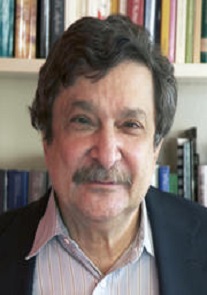Roy Mottahedeh
(d. 1446/2024)
Posted on May 01, 2019

Roy Parviz Mottahedeh is the Gurney Professor of History, Emeritus, at Harvard University. He served as the Director of the Center for Middle Eastern Studies at Harvard University from 1987 to 1990 and founded the Harvard Middle East and Islamic Review as a medium for Harvard students and teachers to publish their work. He was elected a member of the Academy of Arts and Sciences and the Council on Foreign Relations and has served as a series editor for several academic publishers. In 1994 he was appointed Gurney Professor of History. Together with Angeliki Laiou he co-edited The Crusades from the Perspective of Byzantium and the Muslim World (2001). His book Lessons in Islamic Jurisprudence, published in 2003, studies the philosophy of Islamic law as taught in Shi’ite seminaries. Professor Mottahedeh received an honorary degree from the University of Lund, Sweden, in 2006. He served as Director of the Prince Alwaleed Bin Talal Islamic Studies Program at Harvard from 2006 to 2011.
Professor Mottahedeh is the author of numerous articles that demonstrate his wide range of interests from the Abbasid period in the eighth century to Islamic revival movements of the present day. One of his most widely distributed articles, which has been translated into many languages, was his critique of Huntington’s theory of the clash of civilizations. Professor Mottahedeh’s other publications consider such diverse topics as the transmission of learning in the Muslim world, the social bonds that connected people in the early Islamic Middle East, the theme of “wonders” in The Thousand and One Nights, the concept of jihad in the early Islamic period, and perceptions of Persepolis among later Muslims.
In 1960 he graduated magna cum laude in history from Harvard College and was awarded a Shaw Traveling Fellowship which he used to explore Europe, the Middle East and Afghanistan. He then undertook a second B.A. in Persian and Arabic at the University of Cambridge in the UK, where he received the E. G. Browne Prize. In 1962 he returned to Harvard for doctoral studies in history, where he studied with Sir Hamilton Gibb and Richard Frye. He was elected a Junior Fellow in the Harvard Society of Fellows and received his PhD in 1970 for a dissertation on Buyid administration.

